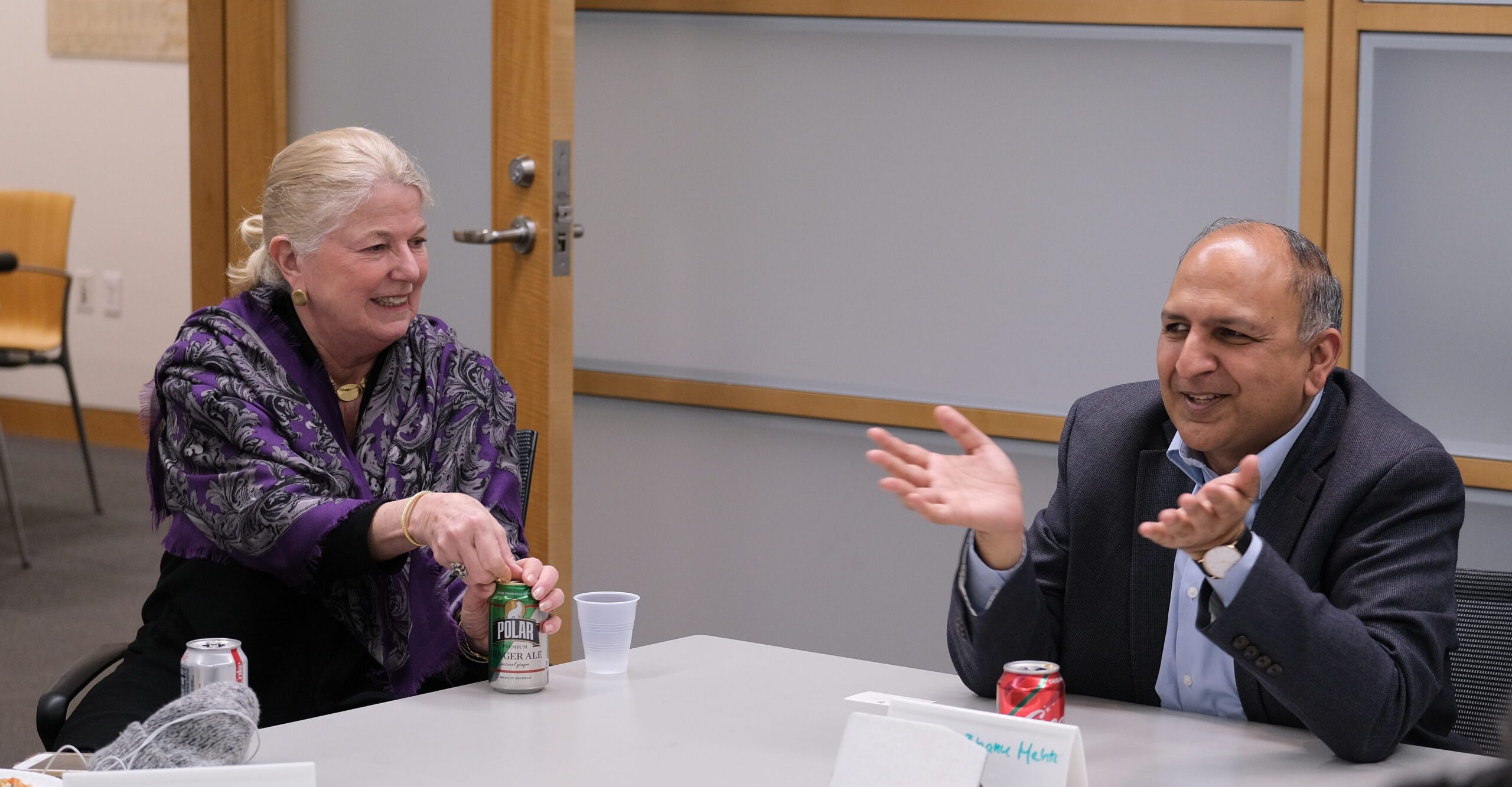
Dr. Pratap Bhanu Mehta, Vice Chancellor of Ashoka University, speaks about the foundation and development of Ashoka with faculty and doctoral students at the Mittal Institute. Margot Gill, left, Administrative Dean for International Affairs at Harvard University, joined the conversation.
On February 15, 2019, Dr. Pratap Bhanu Mehta — Vice Chancellor of Ashoka University in India — visited the Mittal Institute for an informal lunch with faculty and doctoral students. At the lunch, Dr. Mehta discussed the creation of Ashoka University, its commitment to the liberal arts, and its plans for its future.
Creating a New Liberal Arts Standard in India
Ashoka University, a fledgling but already competitive school founded in 2014 in Sonepat, Haryana is home to about 1,700 undergraduate students. The school is growing rapidly and aims to hire 40 faculty members per year over the next 10 years, targeting a faculty to student ratio of one to 10. The student body itself is highly diverse, representing 100 towns, and with a 56 percent female and 44 percent male composition. It hosts numerous exchange programs with other universities. In particular, it participates in an exchange program with Princeton University in New Jersey: each school sends 15 students to one another for 4-credit summer programs, with credits counting toward degrees at the participants’ own schools.
Currently, the university is in Phase 2 of its approach. Its leaders aim to increase undergraduate enrollment significantly and to roll out a graduate school, with ambitious plans for a PhD program.
Standing Out from the Crowd
The university is distinctive in India for its core emphasis on the liberal arts. Within the undergraduate curriculum, all students are required to take a series of two courses called Critical Thinking Seminars. “This is a year-long sequence, which is a small group experience — so the small class size is one distinguishing feature of Ashoka. During the first course, students learn critical thinking through writing, since the program is aligned with the writing center,” Dr. Mehta explained. He elaborated, saying that Ashoka is inspired by Princeton University’s commitment to liberal arts education.
With traditional rote memorization taught in India’s schooling system, courses in critical thinking are a way for Ashoka to stand out from the crowd. By establishing foundational knowledge in this area, students learn how to build on an idea to solve real-world challenges in the future.
Building Good Governance
According to Dr. Mehta, the university is run on collective decisions, rather than driven by the goals of a single philanthropic founder, and academic issues are addressed by academics — not founders.
One important theme for the university is building its value in the eyes of onlookers, despite the challenges it presents. “In India, you cannot sustain the social legitimacy of an enterprise like Ashoka unless it belongs to everybody in India. And I think what we have learned from the history of American universities is that it took a long time to get there,” Dr. Mehta explained. But Ashoka is already on its way there, becoming a well-known, viable, and competitive place to learn — while presenting a major departure in the way universities in India have been conceived and run in the past.
Creating Valuable Degrees
Dr. Mehta noted that a liberal arts degree in India has presented an interesting challenge in the working world for post-graduates, but it’s picking up steam. On the job market, a liberal arts degree turns new graduates into attention-grabbing job candidates, standing out from other applicants. Ashoka University has been working to open up a dialogue with Indian industries, proving to them that liberal arts degrees are just as valuable — and some of the private sector has already been receptive to it. As Ashoka continues to grow, it will quite possibly set the standard for future liberal arts education institutions in India.
We at the Mittal Institute were glad to host the Vice Chancellor of Ashoka as part of our commitment to work with and support the educational infrastructure of India.
